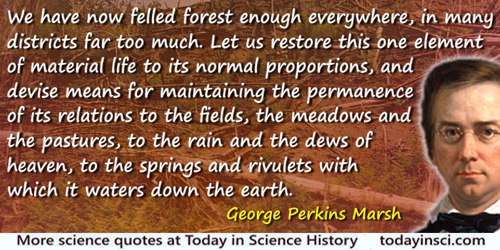 (source)
(source)
|
George Perkins Marsh
(15 Mar 1801 - 23 Jul 1882)
American conservationist who was the first to reveal the menace of environmental misuse, to explain its causes, and to prescribe reforms.
|
Science Quotes by George Perkins Marsh (12 quotes)
All Nature is linked together by invisible bonds and every organic creature, however low, however feeble, however dependent, is necessary to the well-being of some other among the myriad forms of life.
— George Perkins Marsh
From Man and Nature (1864), 109.
Apart from the hostile influence of man, the organic and the inorganic world are … bound together by such mutual relations and adaptations as secure, if not the absolute permanence and equilibrium of both … at least a very slow and gradual succession of changes in those conditions. But man is everywhere a disturbing agent. Wherever he plants his foot, the harmonies of nature are turned to discords.
— George Perkins Marsh
In Man and Nature, (1864), 35-36.
Man has too long forgotten that the earth was given to him for usufruct alone, not for consumption, still less for profligate waste.
— George Perkins Marsh
Man and Nature, (1864), 35. The word usufruct comes from Latin words in Roman law, usus et fructus for use and fruit (enjoyment), now meaning the temporary right to the use and enjoyment of the property of another, without changing the character of the property.
Sight is a faculty; seeing, an art.
— George Perkins Marsh
Man and Nature, (1864), 10.
So long as the fur of the beaver was extensively employed as a material for fine hats, it bore a very high price, and the chase of this quadruped was so keen that naturalists feared its speedy consideration. When a Parisian manufacturer invented the silk hat, which soon came into almost universal use, the demand for beavers' fur fell off, and this animal–whose habits, as we have seen, are an important agency in the formation of bogs and other modifications of forest nature–immediately began to increase, reappeared in haunts which we had long abandoned, and can no longer be regarded as rare enough to be in immediate danger of extirpation. Thus the convenience or the caprice of Parisian fashion has unconsciously exercised an influence which may sensibly affect the physical geography of a distant continent.
— George Perkins Marsh
In Man and Nature, (1864), 84.
The equation of animal and vegetable life is too complicated a problem for human intelligence to solve, and we can never know how wide a circle of disturbance we produce in the harmonies of nature when we throw the smallest pebble into the ocean of organic life.
— George Perkins Marsh
Man and Nature, (1864), 103.
The great question, whether man is of nature or above her.
— George Perkins Marsh
Man and Nature, (1864), 549.
The improvement of forest trees is the work of centuries. So much more the reason for beginning now.
— George Perkins Marsh
Letter to C. S. Sargent, 12 Jun 1879. In David Lowenthal, George Perkins Marsh: Versatile Vermonter (1958), 255.
The ravages committed by man subvert the relations and destroy the balance which nature had established between her organized and her inorganic creations; and she avenges herself upon the intruder, by letting loose upon her defaced provinces destructive energies hitherto kept in check by organic forces destined to be his best auxiliaries, but which he has unwisely dispersed and driven from the field of action. When the forest is gone, the great reservoir of moisture stored up in its vegetable mould is evaporated, and returns only in deluges of rain to wash away the parched dust into which that mould has been converted. The well-wooded and humid hills are turned to ridges of dry rock, which encumbers the low grounds and chokes the watercourses with its debris, and–except in countries favored with an equable distribution of rain through the seasons, and a moderate and regular inclination of surface–the whole earth, unless rescued by human art from the physical degradation to which it tends, becomes an assemblage of bald mountains, of barren, turfless hills, and of swampy and malarious plains. There are parts of Asia Minor, of Northern Africa, of Greece, and even of Alpine Europe, where the operation of causes set in action by man has brought the face of the earth to a desolation almost as complete as that of the moon; and though, within that brief space of time which we call “the historical period,” they are known to have been covered with luxuriant woods, verdant pastures, and fertile meadows, they are now too far deteriorated to be reclaimable by man, nor can they become again fitted for human use, except through great geological changes, or other mysterious influences or agencies of which we have no present knowledge, and over which we have no prospective control. The earth is fast becoming an unfit home for its noblest inhabitant, and another era of equal human crime and human improvidence, and of like duration with that through which traces of that crime and that improvidence extend, would reduce it to such a condition of impoverished productiveness, of shattered surface, of climatic excess, as to threaten the depravation, barbarism, and perhaps even extinction of the species.
— George Perkins Marsh
Man and Nature, (1864), 42-3.
We have now felled forest enough everywhere, in many districts far too much. Let us restore this one element of material life to its normal proportions, and devise means for maintaining the permanence of its relations to the fields, the meadows and the pastures, to the rain and the dews of heaven, to the springs and rivulets with which it waters down the earth.
— George Perkins Marsh
From Man and Nature (1864), 328-329.
When not protected by law, by popular favor or superstition, or by other special circumstances, [birds] yield very readily to the influences of civilization, and, though the first operations of the settler are favorable to the increase of many species, the great extension of rural and of mechanical industry is, in a variety of ways, destructive even to tribes not directly warred upon by man.
— George Perkins Marsh
In Man and Nature, (1864), 93-93.
Wherever modern Science has exploded a superstitious fable or even a picturesque error, she has replaced it with a grander and even more poetical truth.
— George Perkins Marsh
'The Study of Nature', The Christian Examiner, 1860, 67, 40.
See also:
- 15 Mar - short biography, births, deaths and events on date of Marsh's birth.
- Address to Agricultural Society of Rutland County - by George Parkins Marsh (30 Sep 1847).
- George Perkins Marsh, Prophet of Conservation, by David Lowenthal. - book suggestion.
- Booklist for George Perkins Marsh.









 In science it often happens that scientists say, 'You know that's a really good argument; my position is mistaken,' and then they would actually change their minds and you never hear that old view from them again. They really do it. It doesn't happen as often as it should, because scientists are human and change is sometimes painful. But it happens every day. I cannot recall the last time something like that happened in politics or religion.
(1987) --
In science it often happens that scientists say, 'You know that's a really good argument; my position is mistaken,' and then they would actually change their minds and you never hear that old view from them again. They really do it. It doesn't happen as often as it should, because scientists are human and change is sometimes painful. But it happens every day. I cannot recall the last time something like that happened in politics or religion.
(1987) -- 


